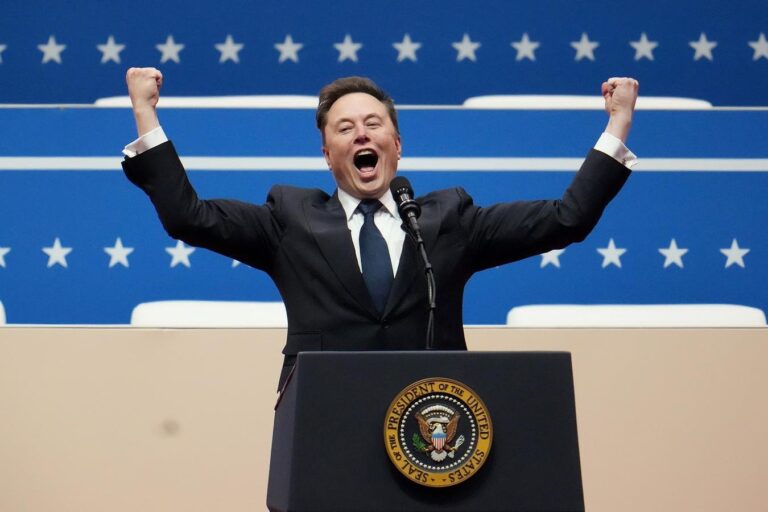As Donald Trump becomes the 47th president, his entry into the cryptocurrency space via meme tokens marks an unprecedented intersection of political power and digital assets. At Washington’s Capital One Arena, where Tesla CEO Elon Musk delivered his inauguration speech, few could have predicted the market turmoil triggered by the launch of two presidential coins.
WASHINGTON, DC – JANUARY 20: Elon Musk, CEO of Tesla, SpaceX and X, arrives to speak at a … (+)
Understanding Meme Coins
Meme pieces typically draw inspiration from Internet culture and trends, deriving their value primarily from community engagement and social media buzz rather than utility.
The recent case of “Daughter Hawk Tuah”, token of Haliey Welchwhich saw its market capitalization drop from $500 million to $25 million within hours of its launch, illustrates the highly speculative nature of these assets. Traders often describe meme coins as a “pure form of gambling” or the equivalent of “buying a lottery ticket,” highlighting their inherent volatility and risk profile.
However, $TRUMP and $MELANIA tokens represent a more complex scenario. Despite attempts to present them as simple “expressions of support”, these tokens increase critical questions about securities regulation, conflicts of interest and political financing.
Speculative nature
The launch of these presidential tokens demonstrated the volatile nature of meme-based cryptocurrencies. Hours after the launch of $MELANIA, the $TRUMP token saw a dramatic 50% price drop, from $75 to $30, before stabilizing around $64. $MELANIA’s market cap quickly reached $13 billion, while $TRUMP’s fluctuations wiped out approximately $7.5 billion in market value in 10 minutes.
The emergence of these politically linked tokens raises important regulatory questions. Norman Eisen, ethics advisor under the Obama administration, characterized the situation as being potentially “the worst conflict of interest in the modern history of the presidency.” The new president’s direct connection to these speculative assets, combined with his future role in regulating the cryptocurrency sector, presents unprecedented challenges.
The Strategic Importance of WLF’s Ethereum Accumulation
What makes these meme tokens intriguing is their technical implementation. While the $TRUMP token was initially launched on the Blockchain SolanaSignaling the network’s growing importance in the coin space, other significant developments have taken place on the Ethereum network over the past few days.
According to on-chain transaction data And Arkham Intelligence DataWorld Liberty Financial (WLF), the company behind $TRUMP tokens, recently converted $20 million worth of USDC into 6,041 ETH, significantly increasing its investment in the Ethereum ecosystem.
WLF portfolio structure
Data (accessed January 21, 2025) from Arkham Intelligence (arkham.intel) shows that WLF’s crypto portfolio, valued at $327.6 million, includes:
- 57,000 ETH worth $184 million is the largest holding (which grew from 39,000 ETH worth $128 million in less than 24 hours)
- Stable allocations of $54 million in USDC
- DeFi protocol holdings, including $6.45 million in Aave and $6.21 million in Chainlink
Screenshot showing key stake and ownership of World Liberty Financial
Technical architecture and strategic vision
WLF’s approach demonstrates careful orchestration across multiple blockchains. Their portfolio composition, with over 55% in ETH and strategic positions in key DeFi protocols, suggests readiness for advanced financial products. Smart contract integration has attracted significant attention, especially after Orbiter Finance contributed 10 ETH via its OmniChain interoperability protocol. This technical base, backed by major crypto companies including Ripple, Coinbase and Kraken, portends ambitious plans for sophisticated financial instruments.
Future trajectories and market impact
The lockdowns extending throughout the first year of Trump’s presidency add yet another level of complexity to this unprecedented situation. The potential for token migration, launch of new financial products, and integration with established DeFi protocols suggests that these assets could reshape the landscape of politically affiliated digital markets. In other words, those who support President Trump are literally being rewarded.
Although the strategy seems sophisticated, several factors deserve attention and can have a considerable impact on the market:
- Regulatory Implications of Presidential Involvement
- Market Impact of Potential Token Migration
- Effects of Lockup Period on Token Value
- Cross-chain security considerations
Although the prospect of looser crypto policy regulation has been taken into account excitement by the industry and accelerated bitcoin’s rally following Trump’s victory in November 2024, the combination of political influence and speculative assets could ultimately undermine rather than strengthen confidence in cryptocurrency markets. This could challenge the industry to navigate uncharted territory where governance, technology and finance converge in new ways, and not necessarily in a good way.
Digital plutocracy: the mask slips
The emergence of presidential meme tokens and their integration into a sophisticated financial infrastructure signals a worrying shift in American democracy. While the United States has long been characterized by powerful corporate interests, this direct conversion of political authority into digital assets suggests a movement toward a new form of plutocracy, where political power and wealth become increasingly indistinguishable.
The transformation of political capital into actual market capitalization represents uncharted territory, even for a nation accustomed to the influence of wealthy interest groups. This convergence of presidential power, digital finance and wealth creation suggests entirely new realities in the relationship between democratic governance and economic power.
But perhaps what we are witnessing is not so much a transformation as an unveiling: traditional mechanisms of power and wealth are now clearly manifested through blockchain transactions and symbolic valuations. The question that arises is whether popular voice will remain silent in the face of this total transparency, or whether they will remain silent because of the tech giants who control the digital platforms on which public debate takes place. Will we see the promised potential of blockchain?

